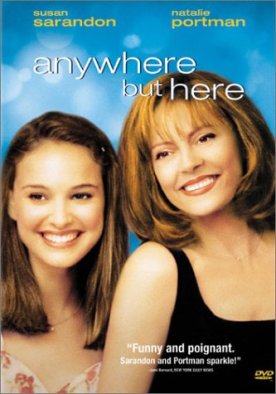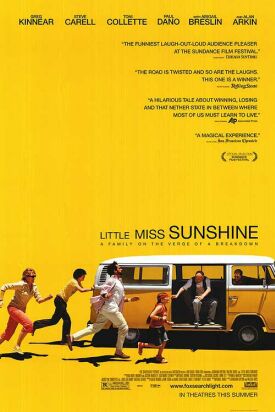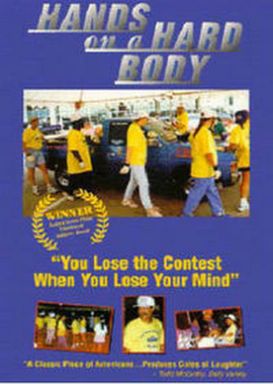Anywhere But Here
Anywhere But Here, Wayne Wang’s adaptation to the screen of a novel by Mona Simpson, is a total chick-flick but still worth seeing for the terrific performances of Susan Sarandon and Natalie Portman as the mother and daughter whose troubled relationship it is all about. In fact, the greatness of these two performances rather exaggerates the film’s one major fault, which is a kind of claustrophobia born of the intensity of love, anger, hatred and desire on both sides of this relationship. The chemistry between Mrs and Miss August, Adele (Miss Sarandon) and Ann (Miss Portman), sucks all the oxygen out of their cinematic biosphere, and everything around them is accordingly withered and dead-looking. But while watching them we hardly care, the two together are so mesmerizing.
Adele is a high school teacher and from Bay City, Wisconsin, who, having shed her boringly decent husband, decides to take her pretty, 15 year-old daughter, Ann, and move to Hollywood, where she is certain the latter must become a star. The original aspect of this familiar idea is that Ann doesn’t want to be a star, has none of the glamour-hunger of a typical teenager or any desire to act at all, and only wants to stay in Bay City where her grandmother, soon to be ex- stepfather, an ice-skating instructor called Ted, and cousins provide her with such a sense of family as she has. But Adele’s relations with the rest of the family are strained, and she heads for the coast in her bronze Mercedes with a sullen and resentful Ann in tow.
There is a natural reversal between the two. Adele is frivolous, irresponsible, self-deceiving, absurdly over-optimistic about their prospects—the natural child of the two—while Ann takes up a sternly moralistic and disapproving attitude more appropriate to a parent. Often, the dialogue seems to have got into the mouths of the wrong speakers. “When are you going to start having some faith in me,” says Adele to some bit of characteristic skepticism on the part of her daughter.
“When you start seeing things as they are,” says Ann.
Yet Ann is never more the teenager than when she pleads with her mother: “Why can’t our lives just be normal?” That they are not normal is mainly owing to Adele’s enormous capacity for wishful thinking and thus self-deception. Not only are they uprooted from the more reliable and nurturing folk left behind in Wisconsin by a fool’s dream of fame, but her mother embarrasses her in front of her friends. Most annoying of all is Adele’s habit of telling Ann, and telling her wrongly, what she, Ann, thinks and feels— the tic of a parent with too much emotional capital invested in a child. When Adele bounces and shakes her head and sings along to a Beach Boys song on the radio as they traverse the wide-open spaces of the West, Ann turns the music off. She doesn’t like the Beach Boys. “Nobody doesn’t like the Beach Boys,” her mother assures her with perfect confidence, turning it back on.
“I miss Ted,” says Ann gloomily a little later.
“Nobody misses Ted,” says her mother. “He’s boring.”
The most electrifying moment in the film comes when Ann, worn down by her mother’s insistence on her being an actress, tries out for a part in a film. Asked to produce a dramatic monologue, Ann simply imitates her mother, perfectly mimicking the foolish and rather tacky self-deceptions that nourish her amour propre. Midway through this performance, Adele walks in. It is not made clear if she changes as a direct result of this experience of seeing herself through her daughter’s eyes—which, of course, is all to the good. It would be unbelievably pat if she did. But the drawback to this reticence is that her direct reaction to it remains inarticulate. We see it in her face, but only as we would see her react to a blow. There should be more to it than this.
In any case, however, there is a change. In the end it is natural that there should be some accommodation between the two of a more or less predictably heart-warming kind—and one which involves some recognition of the similarities between two such different and strong-willed characters. “You wanted to get out of Bay City, didn’t you?” says Ann. “Well, I want to get out of Beverly Hills.” Her way of doing so is as charmingly “normal” as herself, and our warmed hearts do not feel as if they have been cheaply acquired.
Discover more from James Bowman
Subscribe to get the latest posts to your email.





